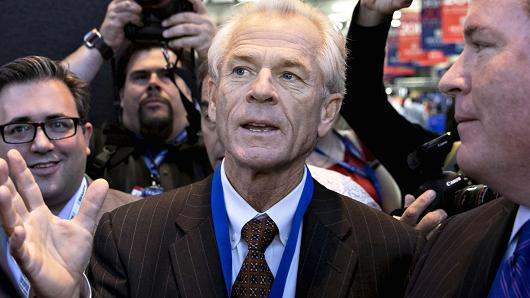WASHINGTON—For Peter Navarro, President Donald Trump’s trade guru, it’s been quite a turnaround.
[Bob Davis | March 8, 2018 | WSJ]
Last spring, he was running the White House’s Office of Trade and Manufacturing Policy, an impressive-sounding group that consisted of himself and an aide in a single room in a building across the alley from the Oval Office. He couldn’t persuade the White House to hire him an administrative assistant, and he reported to the president through his rival, National Economic Council Director Gary Cohn.
The White House, the 68-year-old told some visitors, was like the bloody TV series “Game of Thrones,” and he was dodging arrows. The “deep state”—conservative lingo for the Washington bureaucracy—was trying to torpedo the president, he complained.
Mr. Navarro also urged the U.S. to create a partnership with Europe, Japan “and other victims of China’s mercantilism” to sue China in the World Trade Organization. President Trump has eschewed such multilateralism. The proposed steel and aluminum tariffs would apply to many nations and have raised protests in Western nations and China, producing a kind of ad-hoc coalition against U.S. trade policy.
Early in his White House tenure, Mr. Navarro was boxed in. His National Trade Council—himself and his aide—busied itself trying to help individual companies with trade problems, not setting broad trade policy. Putting the best face on it, Mr. Navarro at the time called it a “SWAT team” approach.
His early appearances on Capitol Hill to explain trade policy didn’t go well. In a February session, he appeared unprepared to answer questions on specific trade issues posed by lawmakers, say Congressional aides. Democratic Sen. Sherrod Brown said in a letter to Mr. Navarro he was “troubled” by what seemed to be the administration’s inattention to steel companies.
In April, the National Trade Council was disbanded and replaced by the less-grandiose sounding Office of Trade and Manufacturing Policy—still Mr. Navarro and his aide. The rebranding effectively demoted him and confirmed that trade was being handled by Mr. Cohn’s NEC. He focused on strengthening the military’s industrial base and examining Buy-America provisions.
“I don’t worry about getting outmaneuvered,” Mr. Navarro said then. “I just worry about getting things done.”
He counted on what he considered a strong relationship with White House senior adviser Jared Kushner, the president’s son-in-law, and said in an interview he sometimes met one-on-one with Mr. Trump. He kept pushing for tariffs, as part of the so-called nationalist wing of the White House that was pitted against the administration’s free traders, especially Mr. Cohn, say those involved with the discussions.
Early on, according to Mr. Navarro, the administration rejected an idea raised by trade economists that they try to work out a deal with China to curb the country’s vast steel and aluminum capacity—the source of the steel that floods global markets.
“Even if you were to come to a negotiated agreement today with China to reduce their overcapacity levels to levels which would basically allow a market price to emerge,” he says, “it would probably take five to eight years, and it would assume China would abide by that agreement, which is a stretch, given their history.”
Mr. Cohn slowed the push for tariffs, but in the end Mr. Navarro won out because his views meshed with the president’s. The president all along wanted tariffs, says Peter Morici, a University of Maryland economist who has long advocated a tougher U.S. trade policy. “That was Navarro’s position. It’s not that Navarro outmaneuvered anybody.”
In a sign of his rising stature, the White House dispatched Mr. Navarro to defend the tariffson three Sunday news shows last week.
Now he is being touted as possible chief of the NEC, which puts together broad economic policies.
Even his ideological allies have doubts about whether he is suited for the job. “He’s a polarizing figure,” says Mr. Morici. “He’s insensitive to people who don’t embrace his view. I can’t see him chairing a meeting with conflicting views and blending them.”
Mr. Navarro declined comment on a possible NEC role.
Next up on the president’s trade agenda are sanctions on Chinese trade—a Navarro favorite.













